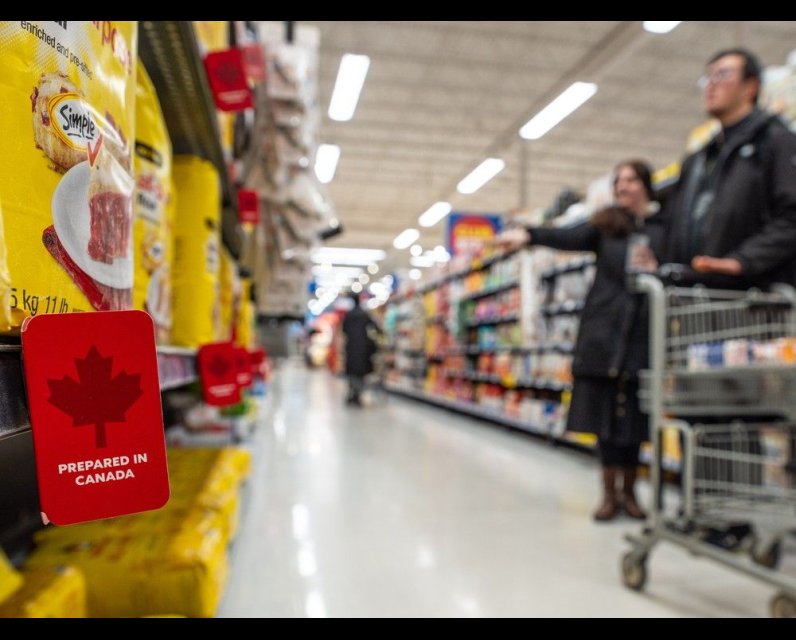Will groceries be cheaper after Canada dropped retaliatory tariffs? Here's what we know

Last Friday, Prime Minister Mark Carney announced that counter-tariffs will be removed, effective Sept. 1, for all U.S. consumer goods that are compliant with the Canada-U.S.-Mexico trade agreement. Canadians are hopeful that prices on groceries will start to fall. But is that a reasonable assumption?
Professor David Soberman, Canadian National Chair in Strategic Marketing at the Rotman School of Management, doesn’t think it will make a huge dent in the average consumer’s weekly shopping bill, for two big reasons.
The two ways Trump’s tariffs on Canada could collapse — despite his fight to keep them“The first is that most of the things that we buy in the grocery store, at this point in time of the year anyway, don’t come from the United States,” he said. “And the second thing is that Canadians have adopted their buying habits and to a much greater degree are buying Canadian, so they wouldn’t actually see a change in the prices of the products based on tariffs being removed.”
Numbers from Loblaw Companies Limited bear this out. The retailer’s CEO, Per Bank, posted to his LinkedIn page last month that he was seeing sales declines in the 15-to-20-per-cent range on products marked with a T for tariffs, “while volumes on products prepared in Canada increase, demonstrating … the strong desire by consumers to continue supporting Canadian products and brands.”
He added: “Some declines are closer to 50%, where a strong alternative exists on our shelves.”
More recently, after Carney’s announcement, a statement by Loblaw reads: “We are pleased with this development, as will be Canadian consumers. In the days ahead, the price of goods in all grocery stores impacted by tariffs will start to come down. Prices will come down over time, as we sell-through inventory that was purchased based on tariffed pricing.”
It added that the T symbol would remain as long as the price of that item is impacted by tariffs.
Matt Poirier, v ice-president of federal government relations at the Retail Council of Canada, said grocers are expressing cautious relief at the change.
“As an industry, we certainly welcome … the government’s reversal of our counter-tariffs because it was just adding to cost and complexity and really messing with supply chains,” he said.
He noted that the last year has been one of complexity and administrative burdens for retailers, between the on-again off-again tariffs, the GST holiday implemented by the Trudeau government before Christmas, and labour disputes at ports, Canada Post and most recently Air Canada, “which is actually a method of shipping goods too, not just passengers.”
As to the million-dollar question of whether food prices will drop, he said: “The short answer is it depends, and that’s simply because there are so many products that were affected by Canada’s counter-tariffs. So it’ll really depend on the goods.”
He noted that some products like orange juice and produce have short shelf lives and will get renewed quickly. Those that can be stockpiled for longer may take more time. And in some cases, grocers may have been able to bring in a large shipment before the tariffs took effect, and only to need to restock after they end, resulting in no change in the price of that product.
Cynical customers may suspect that grocers are quicker to raise prices than they are to lower them.
“That’s a game that retailers have been accused of exploiting for a long time,” said Soberman. “So for example, they’ll get a price increase on a particular type of jam or canned tuna or soup, for example, and they use that increase as a basis to increase their prices at store level, yet what they’re selling for the next three or four weeks is all product that was purchased at the previous wholesale price. So there’s always a little bit of gamery that goes on.”
Poirier pushed back on the notion, based on what he’s heard from grocers.
“They’re very sensitive to their customers’ price sensitivity over the last few years,” he said. “So they’re not planning on messing around with these things. But certainly, there’s so many different goods that were impacted, and everyone might treat that good differently. So you might see orange juice go down faster in some stores than others, but there might be good reasons for that. But retailers are certainly aware of that expectation from consumers and they’re going to try to service that as best they can.”
Poirier also mentioned the Buy Canada movement, comparing it to the drop in travel to the U.S.
“You can look at travel where there weren’t really any tariffs on travel, but Canadians have decided to not travel to the U.S., and boycott regardless,” he said. With tariffs bringing down the cost of some U.S. goods, he said, it will fall to consumers to decide whether to switch back for economic reasons, or keep buying Canadian goods for political ones.
And Soberman pointed out that there hasn’t been an instance of U.S. food products being delisted in the same way that U.S. alcohol was pulled from LCBO shelves by the Ontario government and several others at the provincial level.
“For the most part, grocers will put anything on the shelves that people want,” he said. “It’s all based on what’s moving on the shelves, and their objective is to make sure that their shelves are generating profit. If there are products sitting there that aren’t selling, they want to put something on the shelf that is.”
A hopeful note was sounded by Dr. Sylvain Charlebois, a visiting scholar at McGill University and the scientific director of the Agri-Food Analytics Lab at Dalhousie University. He wrote on X : “Putting politics aside, ending Ottawa’s tariffs was the right decision for consumers. It’s not often we can expect food prices to fall, but September may be an exception. The 25% counter-tariffs had a significant impact on our food inflation rate, as the latest data from Statistics Canada clearly shows.”
"Putting politics aside, ending Ottawa's tariffs was the right decision for consumers. It’s not often we can expect food prices to fall, but September may be an exception. The 25% counter-tariffs had a significant impact on our food inflation rate, as the latest data from… pic.twitter.com/wAxIubQPf7
— The Food Professor (@FoodProfessor) August 24, 2025
Indeed, the latest data from Statistics Canada shows that, year over year, prices for food purchased from stores rose at a faster pace in July (3.4 per cent) compared with June (2.8 per cent). As of July, Canadians were paying a whopping 27.1 per cent more for food purchased from stores than they were just five years ago.
The agency’s charts of food inflation look like a literal roller coaster, as numbers rose to hit a peak of 11.4 per cent at the end of 2022, then fell steadily for the next year and a half, bottoming out at 1.4 in April 2024 before beginning a long, slow climb to their current level.
Our website is the place for the latest breaking news, exclusive scoops, longreads and provocative commentary. Please bookmark nationalpost.com and sign up for our daily newsletter, Posted, here.



Comments
Be the first to comment